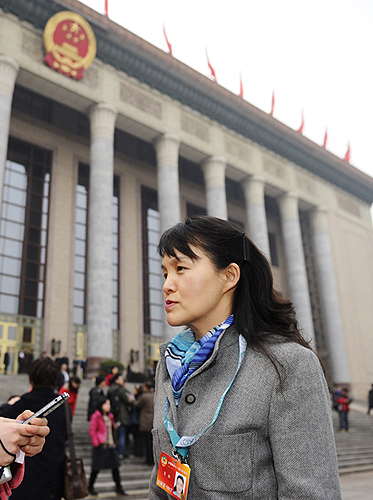 |
|
CPPCC member Xiao Hong, who is also Deputy Director of the Wuhan Municipal Food and Drug Administration, receives an interview from Beijing Review on March 4, 2010 (SHI GANG) |
Provincial governments are working to address problems in the state essential medicine system, said Xiao Hong, Deputy Director of the Wuhan Municipal Food and Drug Administration and a member of the National Committee of the Chinese People's Political Consultative Conference (CPPCC), in an interview with Beijing Review.
Xiao said the government should give priority to improving the public bidding mechanism. At present, it is provincial governments that invite large-scale public bidding. They publicize on their websites information about the pharmaceutical enterprises that have passed the preliminary selection. Then medical and healthcare organizations choose medicine suppliers based on the information.
"In practice, some of the enterprises win bids repeatedly, leaving others without a chance," Xiao said. Every pharmaceutical enterprise aspires to become an essential drug supplier to a hospital because it means continuous and stable orders. Therefore, provincial governments should work to realize fairer competition through a better public bidding mechanism, Xiao pointed out.
Another problem is the high price of drugs. "Drugs are usually inexpensive when dispatched from factories," Xiao told Beijing Review. But having been raised by dealers at different levels, the retail prices of drugs become too high for the public to afford. Resolute and vigorous government efforts are needed to reduce the number of steps in the process and thus avoid the exorbitant profits sought by dealers.
Which drugs medical institutions prescribe requires more attention as well, according to Xiao. The State Essential Drug List contains 307 kinds of chemicals and finished products of traditional Chinese medicine. But numerous medical and healthcare organizations in different regions say the listed essential drugs are far from enough. They have added as many as 200 kinds of medicines to their own regional lists.
In order to meet regional medical needs, the policy allows regions across the country to supplement the list. "Despite this, they should not add drugs without limit," Xiao said. "Otherwise, what is the point of having a state list at all?"
The 307 varieties of essential medicines on the state list were selected by an expert panel based on long-term and comprehensive research. This ensures the list's significance and applicability. In developed countries, such as the United States, about 200 kinds of drugs are listed as essential, and they have proved to be adequate through longtime application.
"Why is our list of 307 drugs still alleged to be insufficient?" Xiao asked, adding that it is necessary to reflect seriously on this issue. She also suggested an effective appraisal system be set up to help restrict the addition of supplemental drugs to the original list.
"The essential medicine policy has been in effect for only half a year," Xiao said. "It is still too early to tell whether we should make adjustments to the essential drug list."
Background
On August 18, 2009, China's Ministry of Health (MOH) and other organs concerned jointly launched implementation of the essential medicine policy. In support of it, Opinions on Establishing a State Essential Medicine System, Measures on Managing the State Essential Medicine List (Interim) and the State Essential Medicine List (2009) were issued as well.
Essential medicines refer to those that satisfy medical and healthcare needs and are available to the public at all times in adequate supply and in appropriate forms.
The State Essential Medicine List contains 307 varieties, including chemicals and finished products of traditional Chinese medicine. More importantly, they are all covered by the country's basic medical insurance and enjoy a reimbursement rate remarkably higher than that of non-essential drugs.
